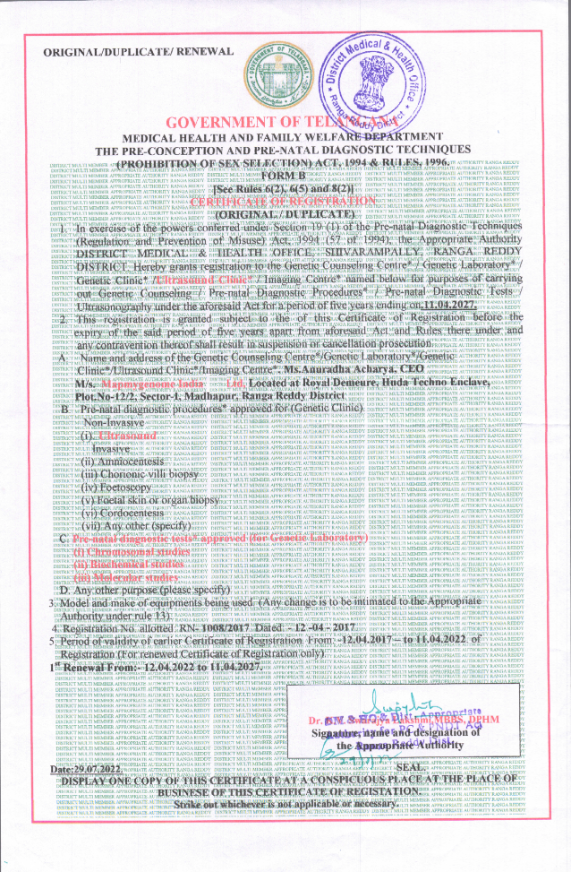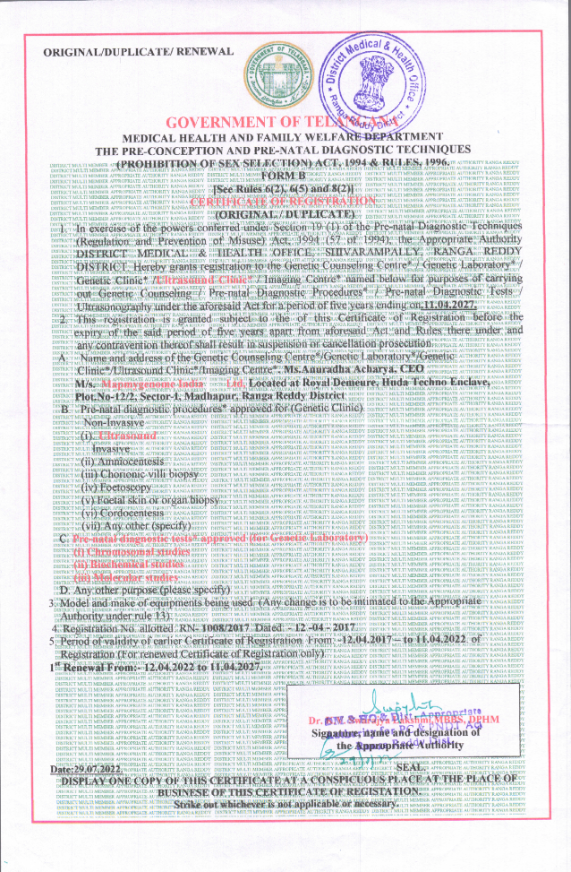एनआईपीटी क्यों महत्वपूर्ण है: गर्भावस्था में आयु और जोखिम कारकों को समझना
गर्भावस्था एक खूबसूरत यात्रा है, लेकिन इसके साथ ही कई चिंताएँ भी जुड़ी हैं, खासकर जब बात आपके बच्चे के स्वास्थ्य की हो। नॉन-इनवेसिव प्रीनेटल टेस्टिंग (NIPT) ने माता-पिता की उन चिंताओं को दूर करने के तरीके में क्रांतिकारी बदलाव किया है। यह सुरक्षित, प्रभावी और ट्राइसोमी 21 और क्रोमोसोमल असामान्यताओं जैसे जोखिमों का पता लगाने के लिए आवश्यक है, खासकर जब माँ की उम्र बढ़ती है।
आइए जानें कि एनआईपीटी इतना महत्वपूर्ण क्यों है, इसमें क्या जोखिम हैं, तथा आयु इसमें किस प्रकार महत्वपूर्ण भूमिका निभाती है।
एनआईपीटी क्या है?
एनआईपीटी (नॉन-इनवेसिव प्रीनेटल टेस्टिंग) एक स्क्रीनिंग टेस्ट है जो विशिष्ट आनुवंशिक स्थितियों का पता लगाने के लिए माँ के रक्त में प्लेसेंटा से डीएनए के छोटे टुकड़ों का विश्लेषण करता है। एमनियोसेंटेसिस जैसी पारंपरिक निदान विधियों के विपरीत, एनआईपीटी गैर-आक्रामक है, जो इसे माँ और बच्चे दोनों के लिए सुरक्षित बनाता है।
प्रसवपूर्व परीक्षण में आयु एक कारक क्यों है?
जैसे-जैसे माँ की उम्र बढ़ती है, वैसे-वैसे बच्चे में गुणसूत्र संबंधी असामान्यताएँ होने का जोखिम भी बढ़ता है। 35 वर्ष से अधिक उम्र की महिलाओं को विशेष रूप से अधिक जोखिम होता है। यहाँ बताया गया है कि क्यों:
-
ट्राइसोमी 21 (डाउन सिंड्रोम) का जोखिम:
ट्राइसोमी 21, जिसे डाउन सिंड्रोम के नाम से भी जाना जाता है, तब होता है जब गुणसूत्र 21 की एक अतिरिक्त प्रतिलिपि होती है। इस स्थिति का जोखिम मातृ आयु के साथ काफी बढ़ जाता है।- 25 वर्ष की आयु में: 1,200 में 1
- 35 वर्ष की आयु में: 350 में 1
- 40 वर्ष की आयु में: 100 में 1
-
अन्य गुणसूत्र असामान्यताएं:
जैसे-जैसे मां की उम्र बढ़ती है, ट्राइसोमी 18 (एडवर्ड्स सिंड्रोम) और ट्राइसोमी 13 (पटाऊ सिंड्रोम) जैसी स्थितियां भी अधिक होने लगती हैं।

एनआईपीटी आयु-संबंधी जोखिमों से निपटने में कैसे मदद करता है
-
जोखिमों का शीघ्र पता लगाना:
एनआईपीटी गर्भावस्था के 10 सप्ताह के प्रारम्भ में ही ट्राइसोमी 21 जैसी स्थितियों की पहचान कर सकता है, जिससे माता-पिता को तैयारी करने या विकल्प तलाशने का समय मिल जाता है। -
उच्च सटीकता:
यह परीक्षण सामान्य गुणसूत्रीय असामान्यताओं का 99% से अधिक पता लगाने में सक्षम है, जिससे गलत सकारात्मक परिणाम की संभावना काफी कम हो जाती है। -
सुरक्षित विकल्प:
एमनियोसेंटेसिस जैसे पारंपरिक आक्रामक परीक्षणों में गर्भपात का थोड़ा जोखिम होता है। एनआईपीटी गैर-आक्रामक होने के कारण उस जोखिम को समाप्त कर देता है।
एनआईपीटी पर किसे विचार करना चाहिए?
यद्यपि एनआईपीटी सभी गर्भधारण के लिए फायदेमंद है, लेकिन इसकी विशेष रूप से निम्नलिखित के लिए सिफारिश की जाती है:
- 35 वर्ष से अधिक उम्र की महिलाएं।
- जिनके परिवार में आनुवंशिक विकारों का इतिहास हो।
- ऐसे माता-पिता जिनकी पिछली गर्भावस्था गुणसूत्र संबंधी असामान्यता से प्रभावित रही हो।
- आईवीएफ (इन विट्रो फर्टिलाइजेशन) के माध्यम से गर्भधारण।
एनआईपीटी परीक्षण की प्रक्रिया
-
नमूना संग्रहण:
इसके लिए बस मां से रक्त लेना ही काफी है। -
डीएनए विश्लेषण:
गुणसूत्र संबंधी असामान्यताओं का पता लगाने के लिए नमूने का भ्रूण के डीएनए के लिए विश्लेषण किया जाता है। -
परिणाम:
परिणाम आमतौर पर 10-12 दिनों के भीतर उपलब्ध होते हैं। सकारात्मक परिणाम की पुष्टि के लिए आगे के नैदानिक परीक्षण की आवश्यकता हो सकती है।
एनआईपीटी परीक्षण की लागत
एनआईपीटी परीक्षण की लागत क्षेत्र और स्वास्थ्य सेवा प्रदाता के आधार पर अलग-अलग हो सकती है। औसतन, भारत में इसकी कीमत ₹15,000 से ₹20,000 के बीच होती है। हालाँकि यह एक निवेश की तरह लग सकता है, लेकिन इससे मिलने वाली मानसिक शांति और कार्रवाई योग्य जानकारी अमूल्य है।
एनआईपीटी के लाभ
-
प्रारंभिक अंतर्दृष्टि:
बेहतर तैयारी के लिए गर्भावस्था के आरंभिक चरण में ही जोखिमों का पता लगाएं। -
गैर-आक्रामक और सुरक्षित:
माँ या बच्चे को कोई खतरा नहीं। -
उच्च सटीकता:
न्यूनतम त्रुटि संभावना के साथ विश्वसनीय परिणाम प्रदान करता है। -
मन की शांति:
स्पष्ट जानकारी प्रदान करके भावी माता-पिता की चिंता कम हो जाती है।
एनआईपीटी के बारे में सामान्य चिंताएँ
क्या एनआईपीटी एक डायग्नोस्टिक परीक्षण के समान है?
नहीं, एनआईपीटी एक स्क्रीनिंग टेस्ट है। सकारात्मक परिणाम की पुष्टि एमनियोसेंटेसिस जैसे डायग्नोस्टिक टेस्ट से की जानी चाहिए।
क्या एनआईपीटी सभी आनुवंशिक विकारों का पता लगा सकता है?
एनआईपीटी को विशिष्ट गुणसूत्र संबंधी असामान्यताओं का पता लगाने के लिए डिज़ाइन किया गया है, सभी आनुवंशिक स्थितियों का नहीं।
यदि परीक्षण से जोखिम का संकेत मिले तो क्या होगा?
यदि एनआईपीटी किसी जोखिम का संकेत देता है, तो आपके डॉक्टर निष्कर्षों की पुष्टि के लिए आगे के नैदानिक परीक्षणों की सिफारिश कर सकते हैं।
गर्भावस्था के लिए एनआईपीटी परीक्षण के बारे में अक्सर पूछे जाने वाले प्रश्न
1. एनआईपीटी परीक्षा देने का सही समय क्या है?
आप गर्भावस्था के 10 सप्ताह बाद ही एनआईपीटी परीक्षण करा सकती हैं।
2. क्या एनआईपीटी बीमा द्वारा कवर है?
कुछ बीमा योजनाएं NIPT परीक्षण को कवर कर सकती हैं, खासकर उच्च जोखिम वाली गर्भावस्थाओं के लिए। विवरण के लिए अपने प्रदाता से संपर्क करें।
3. एनआईपीटी परीक्षण कितना सटीक है?
ट्राइसोमी 21 जैसी सामान्य गुणसूत्रीय असामान्यताओं का पता लगाने में एनआईपीटी की सटीकता दर 99% से अधिक है।
4. यदि मेरी आयु 35 वर्ष से कम है तो क्या मैं एनआईपीटी ले सकता हूँ?
हाँ! एनआईपीटी सभी प्रकार की गर्भावस्थाओं के लिए उपयुक्त है, केवल उच्च जोखिम वाली गर्भावस्थाओं के लिए नहीं।
5. परिणाम आने में कितना समय लगता है?
आप 10-12 दिनों के भीतर परिणाम की उम्मीद कर सकते हैं।
6. क्या एनआईपीटी परीक्षण की लागत उचित है?
इसकी सटीकता और इससे मिलने वाली मानसिक शांति को देखते हुए, कई माता-पिता इस निवेश को सार्थक पाते हैं।
चाबी छीनना
- एनआईपीटी प्रसवपूर्व देखभाल में एक क्रांतिकारी परिवर्तन है, विशेष रूप से ट्राइसोमी 21 और अन्य गुणसूत्र संबंधी असामान्यताओं जैसे आयु-संबंधित जोखिमों का पता लगाने के लिए।
- यह सभी प्रकार की गर्भावस्थाओं के लिए उपयुक्त सुरक्षित, सटीक और गैर-आक्रामक विकल्प है।
- प्रारंभिक परीक्षण से माता-पिता को सूचित निर्णय लेने और बेहतर तैयारी करने का अवसर मिलता है।
एनआईपीटी में निवेश करना एक वित्तीय निर्णय से कहीं अधिक है - यह आपके बच्चे के भविष्य के स्वास्थ्य की सुरक्षा के बारे में है। अपने स्वास्थ्य सेवा प्रदाता से अपनी प्रसवपूर्व देखभाल योजना में एनआईपीटी को शामिल करने के बारे में बात करें।
ज्ञान और विज्ञान को आत्मविश्वास और मन की शांति के साथ माता-पिता बनने की आपकी यात्रा का मार्गदर्शन करने दें!









